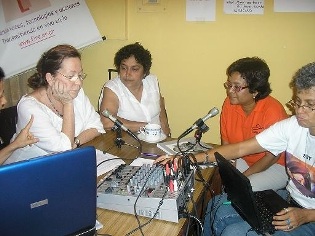Democracy Over the Airwaves
Observatorios de Transgresión Feminista in Nicaragua
Democracy relies on the participation of all people, not just those vested with formal political power. When a group of women in Nicaragua felt their voices weren't being heard, they took to airwaves and the internet in Observatorios de Transgresion Feminista.

Observatorios
On the morning of November 5, 2006-- election day--women across Nicaragua sat down in front of sets of microphones in makeshift radio stations. The Observatoriowas about to begin. In a live broadcast and webcast throughout the day and into the evening, they would speak to each other--and via the internet--the world.
As they gathered in the public plazas and polling stations of the capital city of Managua and smaller townships, women collectively voiced a radical, new vision for their country. They bore witness to their experiences of repressive laws and their efforts to monitor the integrity of putting forth candidates, voting and ballot counting during elections. They spoke about a healthy environment, social benefits for everyone and the eradication of poverty. In doing so, they "transgressed" a 20-year-long status quo of pragmatism in politics in which citizens allowed to have a voice only asked for incremental change.
Their voices were carried in Spanish and English via radio and internet by the Costa Rica-based Radio Internacional Feminista (FIRE) and its initiative, Radio Petatera. The name "petatera" refers to the petate, or Mesoamerican sleeping mat woven of plant fibers. In invoking the woven petate, the women equated their intertwined efforts as weaving a fabric of their own voices -- and social justice -- in Nicaragua.
A Turning Point
Shut out of political participation for nearly two decades, November 5, 2006 represented a moment of political crisis for Nicaraguan women. Women's rights had been eroding in Nicaragua due to persistent economic insecurity, political corruption, authoritarian rule and the transformation of the once-progressive Sandanistas into a conservative movement, led by Daniel Ortega.
The last straw: a 2005 ban on therapeutic abortion, making it illegal to terminate a pregnancy even when the mother's life is in danger. This ban reversed a protective law that had been in place for more than 100 years.
The Nobel Women's Initiative, an organization of six Nobel women laureates working together for peace, called the ban an "11th hour political maneuver," arguing that "women's rights have been cyclically traded for electoral grandstanding and partisan gain."
Giving Testimony
The idea for an Observatorio is rooted in Latin American political culture and history, a tradition whereby people speak of their experiences and their visions for change. Testimonies themselves are a vehicle of political participation. Solidarity and change can come about after people have had a chance to speak--and be heard.
Observatorios reinforce women's local action by mobilizing regional solidarity and media attention around pivotal events. The 2006 Observatorio in Nicaragua was the first. Since then there have been two more: women mobilizing against state repression in Oaxaca, Mexico, in April of 2007 and women mobilizing against the Central American Free Trade Agreement (CAFTA) in Costa Rica in September of 2007. The Observatorio has become an established and effective form of political response.
When a crisis occurs on a local level, the call for solidarity is put out through the communications network and people and resources are mobilized. Radio and internet technologies allow testimony-givers to transcend the boundaries of geography and engage non-locals as virtual observers, building solidarity and increasing the scope and numbers of those who bear witness.
Radio and, more recently, internet-based technologies, allow observations to be broadcast throughout the country in real-time, giving an amplifying platform to voices that are traditionally silenced in the political process. In Nicaragua, the Observatorio resurrected a time in the country's history--the Sandanista Revolution of the 1970s --when women were active and sometimes militant commandantas in shaping political agendas and fighting for change.
New Alliance, New Possibilities
The November 2006 elections were the first in ten years in which opposing political parties were recognized and allowed to put forth candidates. An autonomous feminist movement (MAM) had been building and forming for more than a decade and had recently allied with, Movimiento Revolucionario Sandinista (MRS), a leftist alternative to the increasingly conservative Sandanistas. The MRS was fielding numerous candidates in this election, including some women who also affiliated with MAM.
According to Malena de Montis, a leader in MAM, "For the first time in our country, women have established a new way of doing politics. Women are participating more, and a new force of young women is emerging. This is a very important. An outstanding moment in our history is taking place."
In spite of the women's efforts, the 2006 elections were not free and fair. To date, one and a half years after elections took place, the final official outcomes have not been released; only the results from 92% of total votes. Daniel Ortega remains in power and the ban on therapeutic abortion stills stands.
Municipal elections will take place in Nicaragua in November of 2008. Women are both hopeful and skeptical that these elections will reverse political trends that have slowly and systemically eroded human rights.
Hear the marathon broadcast of Radio Petatera by Radio Internacional Feminista.
Alejandra Bergemann and Lisa VeneKlasen of Just Associates, organization which helps to facilitate observatorios, contributed to reporting.

